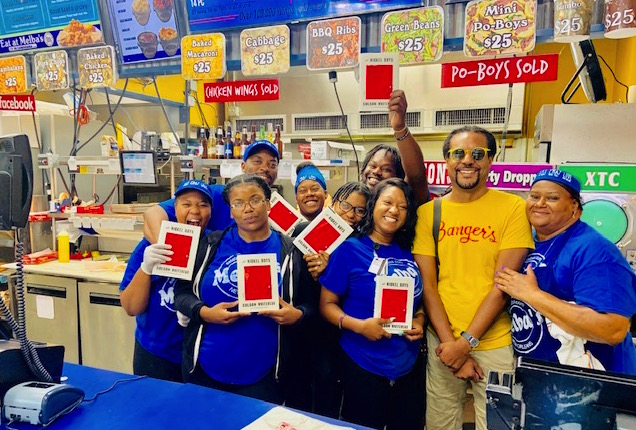A few months ago, I had the pleasure of being a featured author at Melba’s in New Orleans as part of their Eat and Read series. Melba’s has been a unique leader for literacy in the city, offering customers free books with their lunch purchases. Authors read from and sign their books, and engage with customers and staff. Over the years authors have included Sarah Broom, Melissa Rogers, and Colson Whitehead. By combining food and books, folks are united in reading and eating. Melba’s literacy program has the support of the Clinton Foundation, and Bill and Hillary Clinton have even come to visit. It’s an amazing experience to see customers with a book in one hand and a po’boy in the other. I spoke with the woman behind it all—Jane Wolfe—about her love for New Orleans and literature.
How did the literacy program at Melba’s get started?
In 2007, as an older student, I entered academia to acquire a college degree. My graduate advisor was Jonathan Walton and in 2018, he visited New Orleans with his family. We had a book giveaway at Melba’s for his book The Lens Of Love: Reading the Bible in its World for Our World.
In the middle of the book signing, Jonathan looked up and said, “Jane, this is so needed to get these books into the hands of everyday people!” At that moment, I came to understand how I could help literacy in New Orleans.
You chronicle your personal and professional journey in your book, From GED to Harvard Then Inc. 500: How Two Teens Went From GEDs to Building the Fastest Growing Business in New Orleans (ForbesBooks, 2020). What were some of the challenges you faced in shifting from business owner to author?
Authors need time to bring thoughts to fruition. A businessperson does not operate in such a framework: There is no time for reflection in business. The greatest challenge was turning off the day-to-day operational mode of my mind that I used to succeed in business in order to write.
Beyond being a business owner, you have a masters degree in Theological Studies from Harvard Divinity School. How does faith influence your writing and work?
As an older student I was given the gift of time to learn about my faith tradition. Once I understood Catholic Social Teaching I could see more clearly my place in the business world.
My two favorite classes at Harvard were “God and Money” by professor Harvey Cox and “Religion, Politics, and Public Policy” by professor Richard Parker. Their instruction put forth my faith in action at work through Catholic Social Teaching, and most importantly, helped me understand that businesses are not positioned in a society to merely make money. To learn about the world’s sacred scriptures at Harvard Divinity School, my thinking adjusted towards a global perspective. The theological degree allowed writing to come alive in ways I never thought possible.
What books are you currently reading?
Right now I’m reading Religion and the Rise of Capitalism (Knopf, 2021) by Benjamin M. Friedman, Black Women, Black Love: America’s War on African American Marriage (Seal Press, 2020) by Dianne M. Stewart, 70 Hebrew Words Every Christian Should Know (Abingdon Press, 2018) by Matthew Richard Schlimm, NeuroTribes: The Legacy of Autism and the Future of Neurodiversity (Avery, 2015) by Steve Silberman, and Preaching on Wax: The Phonograph and the Shaping of Modern African American Religion (NYU Press, 2014) by Lerone A. Martin.
Photo: Colson Whitehead with staff members of Melba's at an event celebrating his novel The Nickel Boys. Kelly Harris is the literary outreach coordinator for Poets & Writers in New Orleans. Contact her at NOLA@pw.org or on Twitter, @NOLApworg.




